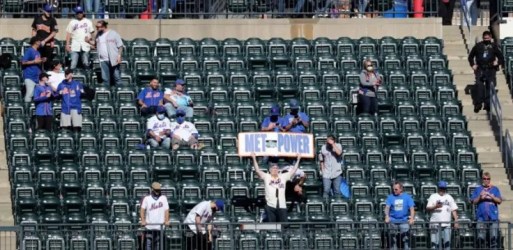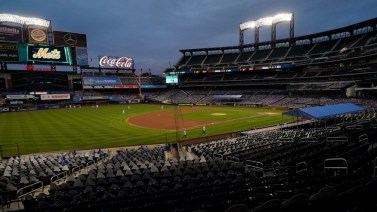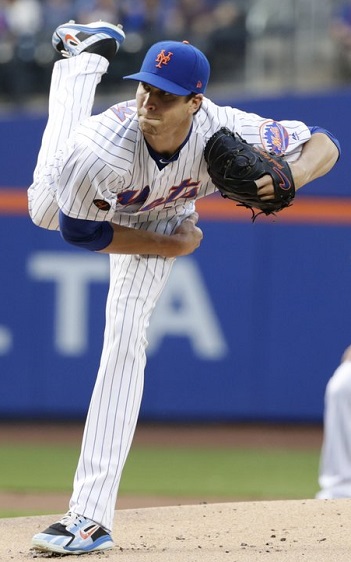
Met fans at Citi Field earlier this month. Bernie Madoff, the man whose grand ripoff made Charles Ponzi resemble a piker and nearly destroyed the Mets, has died.
There’s a 34-story building in Manhattan known as the Lipstick Building. Not because it ever housed a particular cosmetics company but because of its look. It resembles a glass-and-girder lipstick tube. The co-designers were John Burgee Architects and Philip Johnson, the latter a once-fabled disciple of modern architecture’s “White God No. 2” (Tom Wolfe’s phrase) Ludwig Mies van der Rohe.
The Lipstick Building seems an appropriate place to have housed the working offices of Bernard L. Madoff Investment Securities. That firm’s founding father only thought he’d applied enough lipstick to the $65 billion pig exposed as the single greatest ripoff in Wall Street history in 2009, a ripoff that made Charles Ponzi resemble a piker.
As one Tweeter phrased it Wednesday morning, “RIP Bernie Madoff, the man who made Bobby Bonilla day possible.” For openers.
Madoff’s death at 82 was reported earlier Wednesday, the federal Bureau of Prisons saying nothing more other than to confirm the financier’s death. The bureau wouldn’t disclose the actual cause “for safety, security and privacy reasons,” though it was known that Madoff suffered end-stage kidney disease and other maladies.
He was an equal opportunity defrauder, nicking and draining the rich and the modest alike. The reputed 37,000 victims around the world include Nobel Peace laureate Elie Wiesel, film legend Steven Spielberg, Yeshiva University, a Syracuse local of the plumbers’ union, the charity for Jewish leukemia and lymphoma patients despite his younger son’s fight against lymphoma, and an Afghanistan war veteran.
They also included Hall of Fame pitcher Sandy Koufax and a few other sports figures such as former Mets middle infielder Tim Teufel and New York Islanders hockey dynasty wingman Bob Nystrom. And, especially, former Mets owners Fred Wilpon, Jeff Wilpon, and Saul Katz.
The elder Wilpon invested with Madoff beginning in the mid-1980s, not long after he became the Mets’ co-owner and, in time, very likely unaware that promised massive returns were illusory at best. Those promised returns enabled the Mets in 2000 to agree to a buyout of veteran but fading Bobby Bonilla’s remaining contract.
The actual remaining value was $5.9 million. The Mets instead agreed to pay him $1,193,248.20 a year for the coming 25 years at eight percent interest. Bonilla gets that check every 1 July. Wilpon believed that double-digit returns on his Madoff investments would cover the Bonilla buyout and deliver glandular profits above and beyond whatever they’d be paying their former player. Not quite.
The Mets will be on the hook for the Bonilla buyout until 2035. The Wilpons found themselves on the hook for $65 million in loans to meet the Mets’ payroll after Madoff admitted to prosecutors that he’d ripped off billions of his investors’ monies while financing a lavish lifestyle for his wife and family.
Were the Wilpons plain victims like most of Madoff’s clients? Did they know more about Madoff’s bloated ripoff than they let on? One bankruptcy trustee named Irving Picard thought so.
Tasked with recovering monies lost in the Madoff scheme, Picard sued the Wilpons to compel them, as Crain’s New York Business described, to “return $300 million in ‘fictitious profits,’ paid out to their family, their associates, and businesses by Mr. Madoff ’s firm over many years.”
The New York Times called that a “novel claim,” noting Picard “was initially seeking an extra $700 million because he says, the Mets’ owners looked the other way while they benefited from Madoff’s fraud.”
It wasn’t that simple to determine whether the Wilpons and Katz were victims like the others or whether they looked the other way because their investments with Madoff became more of a part of the Mets’ business model than once intended.
“Clearly, Wilpon ignored the warnings because it benefitted him to do so,” argued Sports Are From Venus writer Zachary Diamond in September 2019. “He did not go against Madoff and his fraud at any point because of how financially important it was to his business. Had it not benefited him, Wilpon most likely would have stopped investing with Madoff, as one should do after learning something was fraudulent.”
“Madoff promised and delivered consistent, high, and ultimately false returns of as much as 12%-18% of their investments, which is why the Wilpons and Katz had such an extensive relationship with him,” writes AMNY‘s Joe Pantorno.
Of course, they didn’t know that; relying on Madoff for quick, extra cash as needed to help bolster the Mets’ roster in the late 90s and early 2000s, for example.
But the Wilpons used money made from Madoff as collateral on other loans, so when Madoff went bust, Mets ownership had to borrow $430 million against the team and an additional $450 million against their regional television network, SNY.
It created massive debts that forced the Wilpons to pay over $100 million per year alone, created alongside the annual $43 million payment on Citi Field.
That was why Mets fans’ wishes of their favorite team going out and signing that big-name free agent didn’t happen often enough. That was why a club that plays in the largest sports market on the planet was being run like it played its games in Kalamazoo instead of New York City.
“The fallout shrunk the [Mets’] payroll, from $140 million in 2011 to $95 million in 2012 to $85 million in 2014 as salaries rose across the game,” writes ESPN’s Joon Lee. “Subsequently, the Wilpons slowly lost power and financial stake in the team.”
In 2012, federal judge Jed Rakoff ruled that Picard overshot his target by a glandular distance. “After careful consideration,” Rakoff proclaimed, “the court concludes that the trustee has entirely failed to demonstrate the kind of extraordinary circumstances that would warrant this court in granting his motion,” saying Picard hadn’t proven the Wilpons and Katz “willfully blinded themselves” to Madoff’s chicanery. The Wilpons and Picard settled in due course for $162 million.
When the depth of Madoff’s ripoff was exposed, hedge fund titan Steve Cohen bought a $20 million stake in the Mets. Today Cohen is the Mets’ owner, after buying the Wilpons and Katz’s majority stakes last September. The Mets have since begun behaving like the large market team the Madoff ripoff throttled them from being in its wake.
As of today, according to the U.S. Attorney’s office for the Southern District of New York, victims of the Madoff ripoff have recovered roughly eighty percent of the estimated total $65 billion out of which they were swindled in the first place. The Wilpons and Katz made off with $2.4 billion when selling the Mets.
“Bull or bear market, recession or recovery, Madoff’s clients were always guaranteed a great year,” writes New York Post columnist Mike Vaccaro.” At the very least [Fred] Wilpon — a man who was his own self-made success story in business — was grossly and almost irresponsibly naive.”
Signing shortstop Francisco Lindor to a ten-year, $341 million contract extension just before the current major league season began would have been unthinkable, so long as the Wilpons and Katz remained the Mets’ majority owners while still having to pay over $143 million to retire the loans compelled by the Madoff ripoff.
Madoff’s investment victims weren’t his sole victims, of course. His oldest son Mark committed suicide two years after Madoff’s arrest; his younger son Andrew died of lymphoma in 2014. Mark and Andrew Madoff had listened to their father confess to the racket in December 2008, with the father promising to get things straightened out within the next 24 hours. They didn’t give him the chance, going to their lawyers and then to the authorities.
Ruth Madoff broke off all contact with her husband after the suicide; their grandchildren are said to have changed their names hoping to escape what Town & Country called “the family shame.” Mrs. Madoff was allowed to keep $2.5 million in return for forfeiting all her other assets, the magazine said, and must report any spending over $100 to a bankruptcy trustee.
New York City mayor Bill deBlasio, a man who normally shows wisdom by standing athwart it, says Madoff’s death doesn’t mean it’s time to dance on a grave. “[B]ut let’s just be honest: Many, many people were hurt by his actions,” deBlasio told the press. “It’s time to hopefully turn the page and move forward.”
The victims may first turn to the page on which they’ll see Clarence Darrow saying, “I have never wished a man dead, but I have read a great many obituaries with a great deal of pleasure.”



